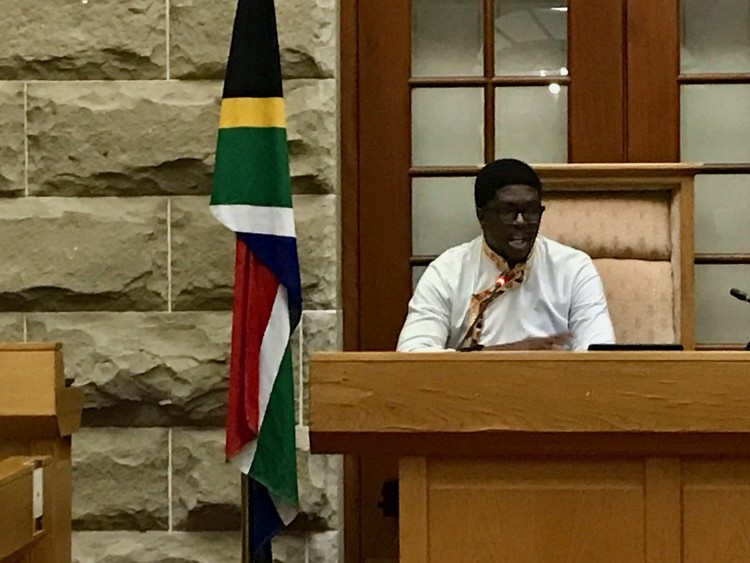MPs furious that families have still not been moved off Cape Town’s railway tracks
SCOPA chair tells authorities to “shape up or ship out”
“Get the job done,” the chair of Parliament’s Standing Committee on Public Accounts, Mkhuleko Hlengwa, told authorities involved in the relocation of families living along the Central railway line in Cape Town. Photo: Tariro Washinyira
- Parliament’s Standing Committee on Public Accounts had harsh words for authorities involved in the relocation of families living near Cape Town’s railway tracks.
- Informal settlements along the rail reserve sprang up after the Central Line was closed in 2019 and the line cannot be fully opened again until they relocate.
- The City of Cape Town, the Passenger Rail Agency, the Department of Transport and the Housing Development Agency all blame each other for delays.
- SCOPA told authorities to find solutions and report back monthly, starting on 27 July.
MPs on Wednesday slammed all the authorities involved in the relocation of families from three informal settlements along the Central railway line in Cape Town.
The Passenger Rail Agency of SA (PRASA), the City of Cape Town, the Departments of Public Works and Human Settlements, and the Housing Development Agency (HDA) all came under fire from the Standing Committee on Public Accounts (SCOPA).
SCOPA chair Mkhuleko Hlengwa sternly told those concerned: “If you do not have progress don’t come here, don’t fly or drive, wasting taxpayers’ money. Go and get the job done.”
The informal settlements in Khayelitsha, Philippi and Langa sprang up when PRASA closed the Central Line in 2019. Part of the line has since been opened, but until the families are relocated, the full service cannot be resumed.
The City and the HDA have been blaming each other for the delays, with the City saying the HDA must acquire land and finance must be provided for the provision of basic services by the municipality.
Deputy Minister of Transport Lisa Mangcu told SCOPA the City was reluctant to help. “It’s not just a matter of getting land. The City needs to roll out bulk infrastructure services.” He said money had been transferred to the City and people were “ready and willing” to move off the rail reserve.
Responding, deputy mayor Eddie Andrews said the City had complied with all expectations.
“We have made it very clear that we will assist with basic services, but only once we have confirmation that land has been acquired. We are committed to assist the HDA once land has been secured.”
He said the families could not be moved into “emergency housing” because by law that would be temporary housing “required for households whose houses are inhabitable as a result of a disaster situation”.
“A formal application needs now to be submitted; it can only be submitted if you have acquired land and that is where the impasse is.”
MP Mzwanele Manyi (EFF) said the national public works department should consider expropriating land without compensation. “We are dealing with human beings, people with children that need to go to school.”
Bheki Hadebe (ANC) agreed. “Cape Town is not a republic, it is part of South Africa. I agree … there must be expropriation without compensation if push comes to shove.”
DA MP Robert Lees said everyone agreed the Central line was critical for the City’s economic activity.
“The sad thing about this is that none of this would have been necessary if the Minister of Transport, PRASA board, and PRASA executive at that time had done their jobs,” said Lees.
Hlengwa told the authorities involved to “get the job done”.
“I find this to be the most unprofessional working relationship coming from the government. Money is available but there is no movement. This is not acceptable. Get the job done. Shape up or ship out. If you are not up to this task, leave.”
The committee agreed to meet monthly on the issue, with the next meeting on 27 July. “Come back with progress,” Hlengwa told those present. “I hate babysitting but in this case we will babysit you, we are going to come here every month until you resolve this thing.”
Support independent journalism
Donate using Payfast

Don't miss out on the latest news
We respect your privacy, and promise we won't spam you.
Next: Dunoon residents battle blaze from their shack roofs
Previous: Thabo Bester saga: Bail granted to three more accused
© 2023 GroundUp. This article is licensed under a Creative Commons Attribution-NoDerivatives 4.0 International License.
You may republish this article, so long as you credit the authors and GroundUp, and do not change the text. Please include a link back to the original article.
We put an invisible pixel in the article so that we can count traffic to republishers. All analytics tools are solely on our servers. We do not give our logs to any third party. Logs are deleted after two weeks. We do not use any IP address identifying information except to count regional traffic. We are solely interested in counting hits, not tracking users. If you republish, please do not delete the invisible pixel.

